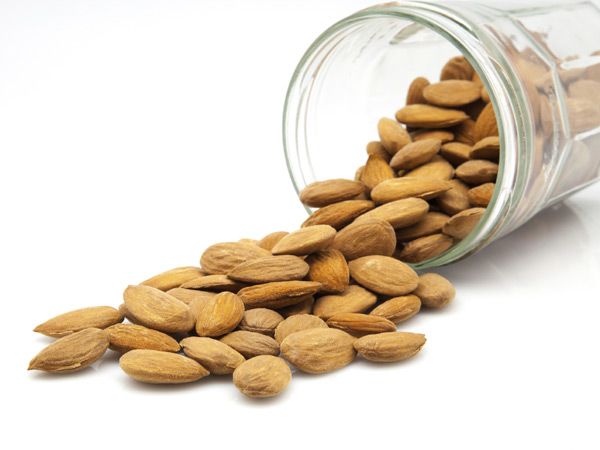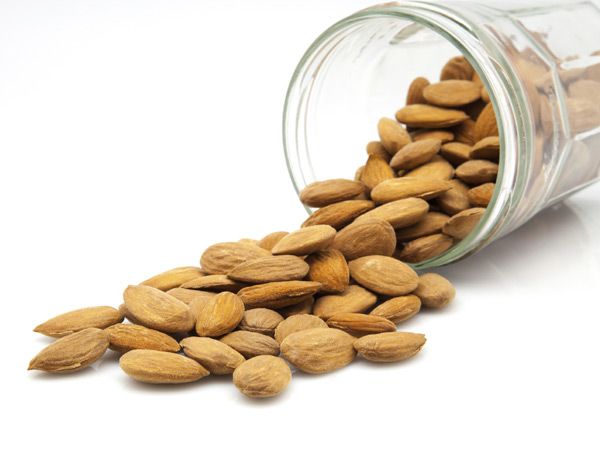
Almond, known as the king of nuts, is a highly nutritious food. It is rich in almost all the nutrients needed by the body. It is a good source of dietary fibre, heart-healthy monounsaturated fat, high quality protein, vitamin E and magnesium and other minerals like potassium, calcium, phosphorus and iron.
It is an effective health-building food, both for the body and mind. New research shows that almonds not only provide essential nutrients but also helps fight obesity, heart disease and diabetes.
Cracks obesity
Almonds crack obesity. It is not as nutty as it seems. Research studies show that going on an almond low calorie diet (LCD) not only makes you lose weight more effectively, it makes you healthier while you lose.
Eat more, absorb less
Normal chewing of almonds breaks down only some of the cell walls, leaving others intact. While the protein in the almond is highly digestible, the lipid material (fat component) is largely unabsorbed. Thus, not all the fat is available for digestion, making it a lower calorie food than suspected.
Eat and satiate
Due to the high fiber content almonds have greater levels of satiety. This greater satiety leads to an overall satisfaction of hunger that can help people maintain a healthy weight. Food records from participants also showed that almonds replaced less healthy high calorie snacks in their diets.
Resistance to obesity
The International Journal of Obesity in Duarte California conducted a study on which two groups of people were put on diets, which differed only in the relative amounts of carbohydrates, fats, and fibre. One group was given a diet consisting of a formula supplemented by vitamins and minerals, and a 84 grams (3 oz.) of whole unblanched unsalted almonds. The other group was given a self selected amount of complex carbohydrates equivalent in calories to 84 g almonds. The differences between the diets in reductions in weight, BMI, waist circumference and systolic blood pressure were all significant, in favour of the almond containing diet.
- The study showed that adding nuts (specifically, almonds) to a lowcalorie diet may improve actual weight loss.
- It may also enhance the effects that weight loss has on blood pressure and the blood lipids.
- Blood insulin levels decreased more with the almond LCD.
- Systolic blood pressure decreased more with the almond LCD.
- While the weight loss in the carbohydrate LCD leveled after the first 16 weeks, volunteers on the almondLCD continued to lose weight over the full 24 weeks study period.
Other health benefits
Healthier heart: Scientific analysis shows that patients who ate a handful (1 ounce) of almonds each day lowered their LDL (low density lipoprotein) cholesterol or ‘bad’ cholesterol significantly. This means reduced risk of heart disease. For every 1% drop in cholesterol, there is a 2% drop in the risk of heart disease. Studies have shown that a combination of foods with cholesterol lowering components, including a snack of almonds are safer and have been as effective, as firstline drugs such as statins prescribed for the purpose.
Reduced risk of cancer: Almonds may possibly reduce colon cancer risk. Almonds contain antioxidants or chemopreventive agents that have inhibited earlystage colon cancer in animal studies. Patients on chemotherapy, who were given proteinfortified almond milk showed improved immunity.
Diabetes management: Just as the fibre structure of almonds may block some of the fat from being absorbed, similarly the fibre in almonds slow the actual absorption of the carbohydrates into the body. The University of Toronto pointed out that almonds reduce surges in blood sugar following eating thereby decreasing both insulin secretion and fat oxidation stress — two factors believed to be involved in the development of heart disease and diabetes.
Antioxidant activity: Almonds are the leading food source of alphatocopherol vitamin E, the more powerful and absorbable form of the antioxidant vitamin. Surveys shows that on average men need 5 mg of alphatocopherol and women need 8 mg of alphatocopherol a day to meet their vitamin E needs. We can most effectively close the gap on vitamin E consumption with just an ounce of almonds a day. Cigarette smoke contains many oxidants which have been shown to damage lipids, protein and DNA. The best advice is, if you smoke, stop it; and while you are at it, make it a habit to eat antioxidantrich foods such as almonds, vegetables and fruits.
Phytochemicals: Almonds skins contain high levels of flavonoids. The unique combination of almond phytochemicals in the skin with the alphatocopherol vitamin E in almond fruit keep the socalled “bad” LDL cholesterol from oxidizing, a mechanism associated with the formation of plaque in arteries of the heart. Acting in synergy it plays a codefensive role against atherosclerosis.
Smarter brain: Almonds have various medicinal properties that help in: preserving the vitality of the brain; and curing anemia. Almonds also have excellent laxative properties. Regular application of almond paste prevents early appearance of wrinkles, black heads, dryness of the skin, pimples and keeps the face fresh.
Image courtesy:©Thinkstock photos/ Getty images
More On >> Diet for Women




